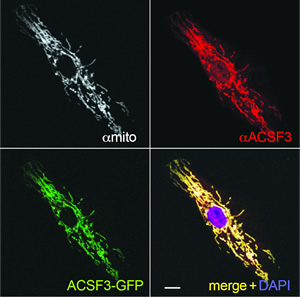Last updated: February 28, 2012
NHGRI researchers serve up mysterious disease diagnosis - three ways
NHGRI researchers serve up mysterious disease diagnosis - three ways
Exome sequencing yields gene discovery in a metabolic disorder, detection of hidden case
 |
A team led by researchers at the National Human Genome Research Institute (NHGRI) discovered the gene mutation that causes CMAMMA. The multifaceted study, published in the August 14, 2011 advance online issue of the journal Nature Genetics, has allowed researchers to understand a cause of CMAMMA and identify an adult presentation of the condition.
Patients with CMAMMA can have a wide variety of symptoms. Children with CMAMMA can suffer from developmental delays and a failure to gain weight and grow. In those who were identified as adults, symptoms may include psychiatric manifestations and neurological problems that can mimic Alzheimer's disease and multiple sclerosis.
"Previous reports suggested this was a severe disease during childhood," said senior author Charles P. Venditti, M.D., Ph.D., investigator in NHGRI's Genetics and Molecular Biology Branch. "Our data show that although some patients can show symptoms at a young age, others present as adults with neurological and psychiatric disease."
The researchers identified the genetic cause of CMAMMA, an enzyme encoded by the ACSF3 gene, that when mutated disrupts the normal metabolism of certain organic acids in the body. The enzyme is in the acyl-CoA synthetase (ACS) family. CMAMMA is the first disease associated with an ACS family member.
"Our body relies on specific enzymes to break down and process amino acids from our food. This metabolism includes a stage when the amino acid is biochemically converted into an organic acid. We discovered the role of an important gene in an entirely new functional pathway that affects organic acid metabolism in humans," Dr. Venditti said. The bow on this neat biochemical package is the researchers' finding that ACSF3 is localized in the mitochondria, the cell organelle that is mainly responsible for the provision of energy in the cell.
Though methylmalonic acidemia — an increase in one of the two toxic outputs in CMAMMA — on its own can have other genetic causes, the researchers concluded that CMAMMA has a distinct cause. CMAMMA, like most metabolic disorders, is an autosomal recessively inherited condition. Symptoms of the disease occur when the DNA of an affected individual contains two copies of the genetic mutation.
The researchers made the gene discovery in a woman whose DNA sample and those of her parents underwent exome sequencing. This is a process in which a DNA sample is run through a sequencing device, which spells out the order of chemical bases for just the 1 to 2 percent of a person's complete genetic code that contains protein-coding genes. An entire genome sequence accounts for three billion letters of code in the four-letter genomic alphabet; an exome is a fraction of that effort but is focused on the code for proteins. The sequencing was performed at the NIH Intramural Sequencing Center (NISC), administered by NHGRI.
Exome sequencing identified alterations in 12 possible genes that might account for the disease. Researchers focused their attention on ACSF3, which contains the code for an enzyme thought to be localized to the mitochondria. The researchers found one mutated copy of the gene in each unaffected parent and two copies of the mutation in the woman with the disorder.
The researchers located mutations in this same gene in seven of eight additional affected individuals. While five of the patients received a childhood diagnosis, four of these individuals received a CMAMMA diagnosis as adults and were experiencing seizures, memory loss, psychiatric problems and cognitive decline.
Using a novel clinical strategy, the researchers discovered that CMAMMA can cause different disease symptoms in adults. They screened NIH's ClinSeqTM database for exome sequence data, finding data on a previously undiagnosed 66-year-old woman with two mutations in ACSF3. She originally provided her DNA for a study of coronary artery disease. They then found her to have CMAMMA's tell-tale biochemical characteristics and other related symptoms.
"This is an exciting and novel way to diagnose human disease — using a genome-first approach," said Leslie G. Biesecker, M.D. co-author and chief of NHGRI's Genetic Disease Research Branch. "By first analyzing genomic data, we are able to identify patients with very different symptoms and manifestations than we would otherwise predict. This is a new way to expand our understanding of human genetic disease."
They also identified a number of unaffected individuals with one copy of the mutated gene, including four others from the ClinSeqTM database and six people whose exomes were banked in the 1000 Genomes Project dataset, an extensive catalog of human genetic variation.
CMAMMA had previously been considered a very rare condition, with only a few cases reported in the medical literature. The study increases the predicted incidence of CMAMMA from previous rough estimates of one in perhaps hundreds of thousands to now approximately one in 30,000. "Based on this study, CMAMMA is likely one of the most common forms of methylmalonic acidemia, and perhaps one of the most common inborn errors of metabolism," Dr. Venditti said. Inborn errors of metabolism include a class of genetic disorders in which the body cannot properly turn food into energy.
The researchers also found an ACSF3 gene mutation in a dog with CMAMMA that had a neurodegenerative syndrome, confirming the gene and its pathway in a vertebrate species. The canine form of CMAMMA is extremely rare, however, and not widely applicable to veterinary medicine.
"There have been decades of biochemistry research and numerous publications about this gene family," Dr. Venditti said. "Our finding adds to fundamental understanding of this pathway and the function of the novel metabolic enzyme coded by ACSF3 and may help us to develop therapies for patients with CMAMMA in the future."
Last Reviewed: February 28, 2012
